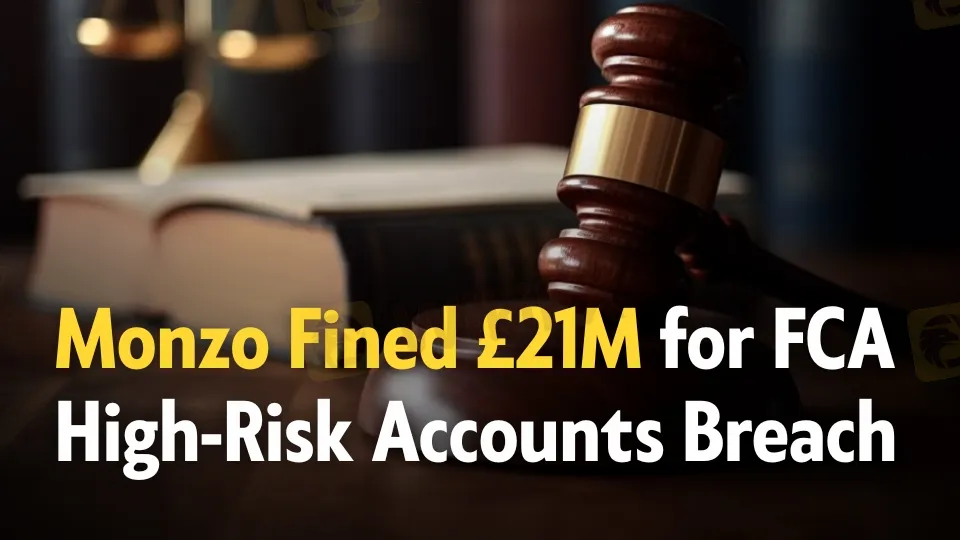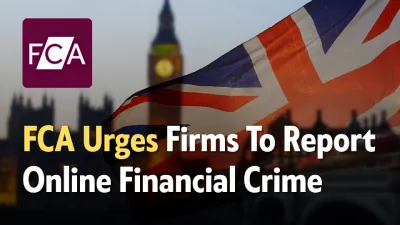Monzo Fined £21M: FCA Slams Bank Over High-Risk Accounts Breach
Abstract:The FCA fines Monzo £21M for anti-money laundering failures, citing high-risk account breaches and systemic control failures. Discover Monzo’s response and improvements.

Monzo Bank Ltd has been hit with a £21,091,300 fine from the UK‘s Financial Conduct Authority (FCA) for serious lapses in its anti-financial crime controls between October 2018 and August 2020. This penalty underscores Monzo’s failure to keep its financial crime defenses robust during a period of explosive growth, a misstep that exposed the bank to significant risks. The FCA has been cracking down on UK banks for anti-money laundering (AML) shortcomings, and Monzos case stands out due to its rapidly expanding customer base, which jumped from 600,000 in 2018 to over 12 million today.
The Monzo FCA fine 2025 highlights why banks and financial institutions must prioritize airtight financial crime controls, especially as their customer numbers soar. Monzo struggled to scale its systems to match its growth, leaving gaps that could have allowed financial crime to slip through.
What Went Wrong with Monzos Financial Crime Controls?
The FCA‘s investigation found Monzo’s financial crime systems weren‘t up to the task of handling its rapid expansion. The bank’s customer onboarding process was shaky, with some customers listing implausible addresses—like famous London landmarks—without proper scrutiny. Worse, Monzos risk assessment systems failed to flag high-risk customers. Between August 2020 and June 2022, the bank breached FCA rules by opening accounts for over 34,000 high-risk customers, despite a clear ban on doing so.
This breakdown in Monzos financial crime controls exposed the challenges digital banks face in balancing growth with compliance, particularly in customer onboarding and transaction monitoring.

FCAs Crackdown on Anti-Money Laundering Failures
Monzo‘s fine is part of a broader FCA push to hold UK banks accountable for weak anti-money laundering systems. Over the past four years, the FCA has fined ten financial institutions, with Monzo being the latest. The regulator is intensifying efforts to stop illicit money from flowing through the financial system, and Monzo’s case shows why. Therese Chambers, FCAs joint executive director of enforcement, put it bluntly: “Banks are a vital line of defense against financial crime. Monzo fell far short of what we, and society, expect.”
By allowing high-risk accounts to slip through, Monzo opened the door to potential money laundering and other illegal activities, a critical failure in its financial crime prevention strategy.
Monzos Response and Steps Toward Compliance
Monzo‘s CEO, TS Anil, acknowledged the FCA’s findings but stressed that the issues were historical, tied to a period ending three years ago. Since then, Monzo has rolled out major upgrades to its financial crime controls through a comprehensive change program. These efforts focus on strengthening anti-money laundering systems, improving customer onboarding, and enhancing risk assessment and transaction monitoring.
Monzo has poured resources into technology and staffing to address the FCAs concerns, following recommendations from an independent review. The bank is now working to position itself as a leader in managing financial crime risks, with a sharp focus on AML compliance.
Financial Crime in the Digital Banking Era
Monzo‘s fine is a wake-up call for digital banks navigating the fight against financial crime. As more people flock to online banking, the risks grow alongside customer numbers. Monzo’s leap from 600,000 to over 12 million customers in just a few years shows how fast digital banks are scaling—and how hard it is to keep compliance systems up to speed.
Criminals are increasingly targeting digital financial systems, so banks like Monzo must stay ahead with innovative anti-money laundering measures. Robust systems are critical to balancing growth with security and compliance.
Moving Forward
The Monzo FCA fine of 2025 serves as a sharp reminder that financial crime controls cant lag behind growth. Monzo has made significant strides in fixing its anti-money laundering systems, and these improvements aim to rebuild trust and strengthen compliance. Still, this case is a broader lesson for digital banks: staying vigilant against financial crime is non-negotiable. As the digital banking world evolves, so must the strategies to keep criminals at bay, ensuring robust systems protect both banks and their customers.

Read more

CONSOB Blocks EurotradeCFD’s Solve Smart, 4X News
CONSOB moves against Solve Smart and 4X News tied to EurotradeCFD, ordering app takedowns and ISP blocks to protect Italian investors.

FCA Urges Firms To Report Online Financial Crime
FCA calls all regulated firms to report unlawful online promotions, tackling financial crime and deepfake scams under new compliance standards.

China’s Myanmar Scam Crackdown Intensifies with Death Sentences
China escalates its crackdown on Myanmar-based scam syndicates with death sentences and mass repatriations amid rising cross-border cyber fraud.

He Clicked, He Transferred, and He Lost RM1.86 Million!
A former sales director in Perak has seen RM1.86 million vanish into an online investment scheme that promised profits but delivered nothing, in what police warn is part of a surge in sophisticated digital fraud sweeping Malaysia. Lured by a polished social media advertisement and reassurances of high returns, the 50-year-old investor only realised he had been duped when his “profits” suddenly became inaccessible. By then, 23 transfers had already drained his savings into accounts controlled by scammers.
WikiFX Broker
Latest News
Behind the Licences: Is Pepperstone Really Safe for Malaysians?
Promised Recession... So Where Is It?
Hirose Halts UK Retail Trading Amid Market Shift
CONSOB Blocks EurotradeCFD’s Solve Smart, 4X News
FINRA Fines United Capital Markets $25,000
Oanda: A Closer Look at Its Licenses
FCA Urges Firms To Report Online Financial Crime
IBKR Jumps on September DARTs, Equity Growth
Service Sector Surveys Show Slowdown In September Despite Rebound In Employment
Rate Calc

